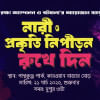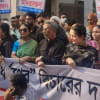It could’ve been any one of us in Moumita’s place

In cases of being subjected to violence, being the woman in the story is difficult. She is constantly at the risk of getting her narrative hijacked by the nit-pickers, power-holders, so-called well-wishers, pacifiers, prestige-rescuers, and of course, men. As I had started writing this, I was still reeling from the news of Dr Moumita Debnath from the neighbouring country, who met her demise in the most gut-wrenchingly painful and inhumane way imaginable. Moumita was a trainee doctor on duty when she was brutally raped and murdered. Even in her final hours, she was denied the slightest ounce of decency. The pain they inflicted on her was put on display in cold blood, snipping some invisible wings here and there across borders, setting us back just a little further and serving us once again, a grotesque reminder of what awaits if we dare to "act too smart."
I don't think it is possible for the "dominant sex" to even begin to fathom how deep such a piece of news can cut a woman. Women live their lives watching over their shoulders everywhere they go because their struggles have added layers, layers that can deeply wound them. They cannot show their fear because that makes them weak, they cannot assert their strength because that suggests they are "asking to be taught a lesson." They walk on eggshells which say, "You asked for independence, there you have it" or "That's equality for you."
Women, no matter how old or young, are always on somebody's radar. It's terrifying how anyone from any part of society can have almost the same power over a woman and her choices as the men in her life. That is only because they are women; viewed as prey first, humans later. Women seeking help on social media, a platform frequented by many supposedly "woke" individuals, are often met with curses and conspiracies that seek to invalidate their struggles. Once a rumour starts spreading, the original incident is never viewed the same way again, and, ironically, in the end, women often find themselves apologising for the injustices done to them.
When it comes to providing a viable solution for women's safety, people are quick to prescribe home arrest, a change in the way they dress, and ultimately, fall back to despair over how the "system" functions. Animosity toward all matters feminine among the general public has always been critical, contributing to toxic masculinity and identity crises among many men who perhaps genuinely wanted to do the right thing. Returning to the idea that the tragic news of one woman can have a ripple effect, shaking every woman, if not every person, to the core, it's women who suffer the most in all of this. When they protest, it is easy to reduce them to noisy, opinionated, over-educated, and "feminist-type" cliches, what is not easy is to see past their demeanour and feel the pain it caused them. How their knees grow weak at the thought of that girl in whom every woman right now sees herself.
For every precautionary step a girl is taught to take before going out, every man should be trained to ensure that such precautions are never necessary for women. For every #MeToo statement, there should be ten people who come forward pledging to protect all women in need, not just the ones in their own families.
This message should have been written in Bangla, and, if possible, in regional dialects. It should have been printed as leaflets, and distributed among the masses, who often remain hidden and are only occasionally disturbed by a woman "who didn't know her place." Rural areas, quiet alleys, busy markets, and crowded vehicles should be covered with posters until the message has been received.
Some women have this idea that speaking out makes them a "bad" girl, it makes them an accomplice to the rebel. This tendency has been an ancient tactic used to control the womenfolk. It has earned women the notorious labels of being prone to "cat-fights" or "being their own worst enemies." A "good" girl gets the degree, a "good" girl has a great husband, and a "good" girl is put on a pedestal because she said nothing. A "good" girl basically can have everything as long as she never questions anything. Were these "good" girls never victims of abuse? The answer is, almost every single one of them has had such an experience.
Perhaps we are still far away from freeing our stories from the grasp of patriarchy. However, our right to live an equal life, free of gender-based violence has been overdue for a long time. The next best time to advocate for it is now.
Benazir Elahee Munni is a Lecturer of English at the Department of English, University of Dhaka.
Views expressed in this article are the author's own.
Follow The Daily Star Opinion on Facebook for the latest opinions, commentaries and analyses by experts and professionals. To contribute your article or letter to The Daily Star Opinion, see our guidelines for submission.

 For all latest news, follow The Daily Star's Google News channel.
For all latest news, follow The Daily Star's Google News channel. 








Comments